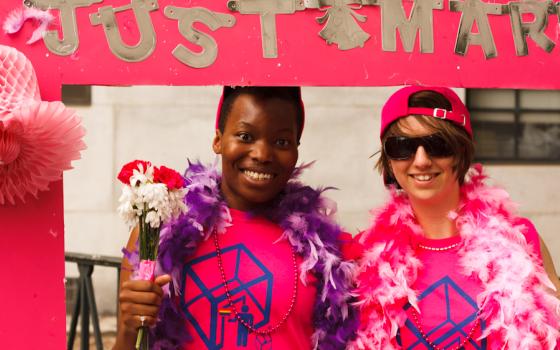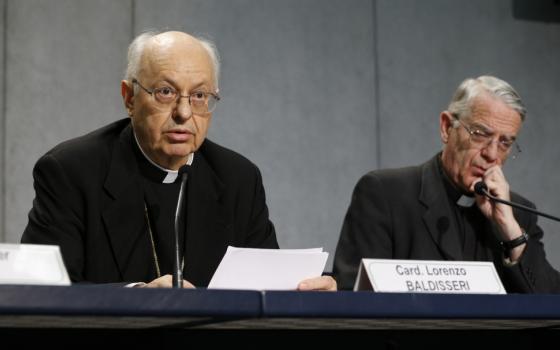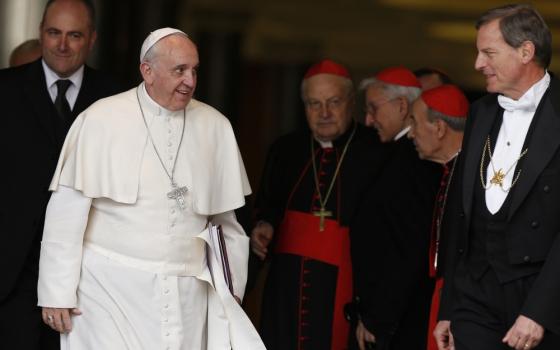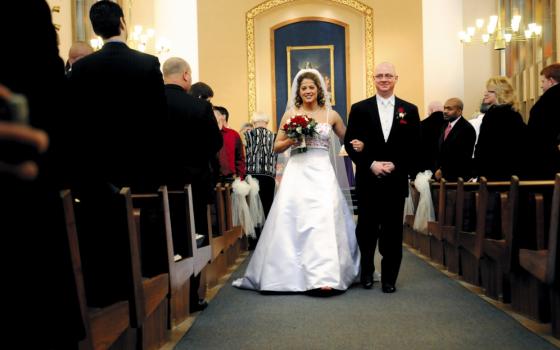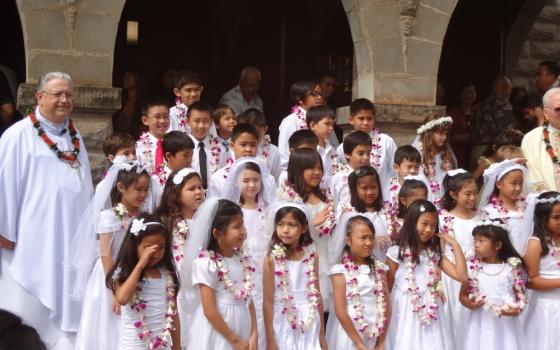Editor's note: For full coverage of the Synod on the Family, go to NCRoneline.org.
Chances are, you probably know more DINKs now than you used to. So-called dual income, no kids households are on the rise in the United States while both men and women focus on their careers, putting off having children until they’ve reached a certain level of success in the workplace. Yet, just a few generations ago, DINKs were unheard of, especially among American Catholics. It almost went without saying: husbands were the breadwinners while wives stayed home, raising the children who inevitably followed their marriage.
Sixty years ago, a marriage like Dave Kolesar’s – gay, Catholic and DINK – was unheard of. But today, Kolesar and his husband, Patrick Wojahn, have been able to carve out their own comfortable niche in the American Catholicism. Married for nine years (three of them legally, after D.C. legalized same-sex marriage), they live just outside of Washington where Kolesar is a radio transmitter engineer and Wojahn is a lawyer and lobbyist. They don’t want children because their lives are too busy, but they attend Mass every Sunday evening.
Are Wojahn and Kolesar at odds with church teachings on homosexuality? Yes. But then again, so are many American Catholics, 52 percent of whom support the legalization of same-sex marriage. Actually, over the last decade, the Pew Research Center reports that Catholics have consistently outpaced almost every other Christian groups in their support of same-sex marriage, despite the fact that the church’s unambiguous teaching that marriage is only between a man and a woman. Furthermore, when asked if homosexual behavior was a sin, only 44 percent of U.S. Catholics agreed.
And that’s one of the topics some 250 people – most of them bishops – will discuss when they gather at the Vatican Oct. 5 for the third-ever extraordinary synod of bishops. Convened by Pope Francis, the group will spend two weeks exploring not just Catholic views on same-sex marriage, but how Catholics around the world do sex, marriage and family and what, to borrow the bishops’ language, is causing the “breakdown” of the family. And while much of the pre-synod discussion has centered on whether divorced and remarried Catholics can receive Communion, the issues up for grabs this month are wide-ranging, including poverty and the need for family-friendly work hours to premarital sex and a lack of concern about abortion.
The fact of the matter is that, in the U.S. at least, many Catholics often express little interest in church teachings on certain family issues. For example, in 2012, the Pew Research Center reported that only 27 percent of Catholics who attended Mass on a weekly basis considered birth control to be morally wrong. When broadened to include all Catholics, that number dropped to 15 percent, and only 43 percent of American Catholics have a strong opposition to legal abortion.
The way Americans view marriage, sex and family is changing, and Catholics are no exception. Divorce, while less common among Catholics than other Americans, is still more prevalent today before; in 2012, the Center for Applied Research in the Apostolate reported that 28 percent of American Catholics who had ever been married had also been divorced. In 2007, the last time CARA published on the topic, almost 5 percent of surveyed Catholic adults were cohabitating with a partner.
“In these times, a widespread social and spiritual crisis is posing a challenge in the Church’s work of evangelizing the family, the vital nucleus of society and the ecclesial community,” opens the bishops’ working document, an 85-page summary of a survey sent to parishes around the world last fall that will serve as the initial reference point for the synod.
“To meet this urgency,” the document continues, “the episcopate throughout the world is being called . . . to listen humbly to the Holy Spirit and reflect on today’s pastoral challenges.”
Conspicuously underrepresented in this discussion, however, are women. Only 25 women were invited to be part of the synod (that’s less than 10 percent of synod participants), and only one vowed religious woman. Although a handful of married couples were invited – a move largely applauded by those concerned that a bevy of celibate men would determine the state of the Catholic family – the overall lack of women bodes ill for a meeting many are hoping will do more good than the commission that preceded the publication of Humanae Vitae.
That includes Sr. Margaret Muldoon, the sole woman religious who will be at the synod.
In an email to the Global Sisters Report, Muldoon, the Superior General of the Sisters of the Holy Family of Bordeaux, said when she found out she was the only woman religious invited, she almost decided not to go.
“I was totally taken aback and questioned the value of going,” she wrote. “On reflection, I came to accept that one is better than none!” At the synod, Muldoon would like her presence to help propagate a more nuanced understanding of the family – one that Catholic sisters have long cultivated through their work with families on the margins of societies.
Muldoon wrote that she hopes the synod will be able to undertake a broadening of the church’s definition of family, one that includes the diverse families that are actually trying to live their lives within the church. Furthermore, she hopes the synod will be able face the fact that “truth can’t be put into doctrines and dogmas that are clear cut, that separate the good and the bad,” adding that no one, not even the church, is in a position to issue immutable directives for the family in any case.
“Can we admit that we are at an early stage of understanding the good news of Jesus Christ and the way of being human that he offered and invited us to?” she said, which is not to say that Catholic sisters aren’t aware of the very real struggles of Catholic families. On the contrary, women religious working with young people and in family ministries are keenly aware of their pastoral challenges.
Take Congregation of Notre Dame Sr. Susan Kidd, for example. As the sole campus minister at the University of Prince Edward Island in Canada, Kidd interacts daily with the very same young people the church sees eschewing their parents’ and grandparents’ view of marriage. Comparable to numbers in the United States, 11 percent of Prince Edward Island’s households are cohabitating couples, an issue of particular concern to the synod.
“Do I see it? Yes,” she said from her office at the heart of the university’s campus. “It’s interesting because these kids will commit to a mortgage before they’ll commit to the sacrament of marriage, and they don’t see that as incongruous.”
What they do see as incongruous, Kidd said, is the Catholic church – an institution they perceive as having lost a lot of moral credibility – demanding that they make nearly impossible financial decisions all for the sake of morality.
“These kids are in debt from education loans. If they go all the way, they’re going to graduate with at least $80,000 debt, and that’s just kind of part of their lives,” Kidd said. So young couples move in together, jointly taking on a mortgage or rent in an effort to save money and pay down their debt.
And if the relationship doesn’t work out?
“It’s easier to declare bankruptcy,” Kidd said, “so they would rather deal with a bank than with faith or with judgmental people.”
Judgment, however, is one of the things the synod hopes to move parishes away from, at least in certain situations – like teen motherhood, for example. Instead of being ostracized, the document reads, single teen mothers ought to be “esteemed for the love and courage with which they welcomed the life conceived in their womb and now provide for the upbringing and education of their children.”
Cohabitation, on the other hand, is living situation for which the church may have grace (last month, Pope Francis, married 20 Roman couples, some of them previously cohabitating), but no patience. In fact, the working document lists the church’s teaching on cohabitation among a slew of directives (the others being those on birth control, divorce and remarriage, homosexuality, fidelity, premarital sex and in vitro fertilization) the bishops say Catholics simply choose to “overlook.”
In fact, this so-called overlooking is so endemic that Cardinal Luis Antonio Tagle of Manila, one of the synod’s three plenary session chairs, had to admit that it hints at a shocking indication that Catholics do not understand the church’s teachings on family life.
And that may be true.
In the U.S., at least, some Catholics may genuinely not know what the church teaches about sex, marriage and family. Fewer are hearing it at church because they aren’t going (depending on whom you ask, the number of American Catholics attending Mass every week is either less than a quarter or less than half), and fewer are learning it in school since both the number of American parochial schools and the enrollment in those schools has drastically decreased over the last generation.
Today, a lot of the responsibility for religious education falls on extracurricular parish programs, but how many families are really interested?
To hear it from Notre Dame Sr. Bernadette Turgeon, the director of religious education and youth ministry at the Parish of the Transfiguration in Manchester, N.H., for some families, Catholicism has become something of an accessory they put on when it suits them to do so.
“Kids are coming to make first Communion, and they may never have been in church until I bring them,” Turgeon said, “and we may never see them again.” The reason, she said, is because some parents don’t value religious education anymore. Instead, they see the sacraments cultural rites of passage.
It’s one of her parish’s biggest family ministry problems, which Turgeon says she just doesn’t get. And when she asks parents why they want their children confirmed in a church to which they have no connection, they often tell her they want to get first Communion and confirmation “out of the way” in case their children want to one day be married in the Catholic church. (Which, incidentally, she says is not necessarily a prerequisite).
“This one mother actually said this to me: ‘Sister, your church has the best aisle in the city for a bride to walk down, so I want my son to be able to be married in that church,’” Turgeon said, laughing.
Turgeon says she has tried to meet the various religious education needs of the families in her parish. Youth attendance for religious education is high, near-perfect in some instances, she says, but her efforts to include entire families are often thwarted. For instance, when parents of religious education students said they wanted a special teaching Mass to help them understand the eucharistic liturgy, Turgeon arranged it. But no one came.
She’s currently spearheading an effort to make religious education at the parish an activity families do together, though she’s aware that it’s an uphill battle. But in the end, she says she would be happy if she could reach just three or four families, encouraging them to make faith part of their family structure.
“They do all these sports religiously,” she said, “some families, their kids are on traveling hockey teams, and they religiously go to every hockey game, no matter what part of the country it’s in. But when it comes to doing something with religious education, that’s not important.”
On the other hand, some Catholics are all too aware of what the church has to say about family and sexuality. Dave Kolesar is a lifelong Catholic, but he walked away from the church after high school in part, he says, because what it taught him about himself drove him to suicidal thoughts. But today, he is quite happy. He and his husband have been worshiping with Dignity/Washington, a faith community for LGBTQ Catholics, since they met 13 years ago, and Kolesar says it was exactly what he needed.
“I came back to the church on my own terms,” Kolesar said. “You sort of have to realize that your own sense of self-respect, your system of ethics — it has to contribute to your own sense of mental well-being. If there are church teachings that go against that, go against your own sense of self-worth, then you literally have to discard those teachings . . . the church is supposed to guide you, not drive you into the grave.”
His husband, Patrick Wojahn, agreed, noting Christians of all stripes should be feel welcome and nourished at church.
“For the bishops to come forward to set rules about how we’re supposed to live our lives and relate as a married couple is problematic,” he said. “It really calls into question what gives them the authority to be able to judge that – and I’m sure they would say it comes from God, but every person is fallible. No one person can be the arbiter for everybody of what it means to believe in God, or to be spiritual, or to be Christian.”
And, yet, the inclusion of more Christians is exactly what Sr. Margaret Muldoon would like to see come out of the synod. All Christians should be allowed to participate in the church’s mission, she wrote to GSR, because God sent his son because he loved the entire world. For that reason alone, she added, the church should be more understanding of the Catholic family in all its iterations.
“I hope we are prepared to really listen to the reality of people and to enter into dialogue rather than telling them what to do, be, think,” she wrote.
In 2015, a larger meeting of bishops will meet to continue the work done over the next two weeks, and it is expected that in 2016, Pope Francis will use the information gleaned from both meetings to issue an apostolic exhortation on pastoring Catholic families. It obviously remains to be seen what Francis might say, but Sr. Sue Kidd, while cautiously optimistic, said she is encouraged by the fact that the pope even wants to talk about families.
“When you think of the litany of issues that would be on his desk in the morning – holy smack!” she said. “But as long as the topic is on the table, I’m happy. It’s a step. It’s not the only step, but it’s a step.”
[Dawn Cherie Araujo is staff reporter for Global Sisters Report, based in Kansas City, Mo. Follow her on Twitter @Dawn_Cherie.]
Related - Sister only shows love and acceptance

